Warning: The following contains SPOILERS for every film released by Marvel Studios.
23. Iron Man 2 (2010)
Directed by: Jon Favreau
Screenplay by: Justin Theroux
Everything that was so much fun about the first Iron Man sours in this sequel. Tony Stark's charming bad-boy behavior curdles into unlikable self-destruction, the sort of damaged-goods broodiness that worked in the Dark Knight movies but doesn't sit well within the can-do spirit of the Marvel Cinematic Universe. The first film's sharp, sparkling, semi-improvised repartee devolves here into self-indulgent globs of endless cross-talk banter that wear out their welcome within a few seconds. And Mickey Rourke — playing villain Ivan Vanko, aka the largely made-up-for-the-movie Whiplash — is in an entirely different, much weirder film (at times, it almost seems like he doesn't know his lines).
There are a few bright spots. Both Scarlett Johannson (as Natasha Romanoff) and Don Cheadle (replacing Terrence Howard as James Rhodes) acquit themselves well. Sam Rockwell has a blast playing a skeezy defense contractor with self-tanning stains on his palms. And Jon Favreau still knows how to stage a good action scene. But that can't keep the movie from becoming actively, almost aggressively un-fun.
22. The Incredible Hulk (2008)
Directed by: Louis Leterrier
Screenplay by: Zak Penn
It is nowhere near the fiasco that was Ang Lee's 2003 Hulk (made before Marvel Studios existed), but let's be clear: This isn't a very good movie, either. Still, its sins are gentler, more generic. As an action director, Leterrier lacks the visual imagination of the rest of the filmmakers on this list. Tim Roth's villain — special-ops soldier Emil Blonsky — barely registers as a character before he starts tearing through Harlem as the Abomination. And the romance between Edward Norton's Bruce Banner and Liv Tyler's Betty Ross is kind of silly. But they're still appealing in the roles, and if Norton, who did uncredited work on the script, hadn't famously declined to promote the film after Marvel pushed for a shorter, more action-heavy cut, perhaps he wouldn't have been replaced in the role by Mark Ruffalo.
21. Thor: The Dark World (2013)
Directed by: Alan Taylor
Screenplay by: Christopher Yost, Christopher Markus, and Stephen McFeely (with story by Don Payne and Robert Rodat)
The first Thor gave the Asgardian god-warrior a true narrative arc — from self-assured hubris to self-deprecating humility. In this sequel, Thor (Chris Hemsworth, a hunky god of sorts himself) remains a good, thoughtful warrior from start to finish. But he only really comes alive as a character when he's sharing the screen with his brother Loki (Tom Hiddleston, who is the best thing about the film, but is in the movie less than his internet-melting appearance at Comic-Con suggested). Also: Natalie Portman is given almost nothing to do, other than get "infected" with a soupy universe-destroying substance called the Aether. But Taylor (best known for his TV directing on Game of Thrones and The Sopranos) keeps things moving, and the climactic sequence on Earth has some great, mind-bendy moments. It's a mess, but at least it's a lively mess.
20. Ant-Man (2015)
Directed by: Peyton Reed
Screenplay by: Edgar Wright, Joe Cornish, Adam McKay, and Paul Rudd (with story by Wright and Cornish)
After 11 movies that had only grown more grandiose in scale and scope, Marvel Studios' 12th film downshifted into a refreshing change of pace. In Ant-Man, the world is not in immediate, existential danger — and, for that matter, neither is San Francisco, the city Ant-Man is supposedly set in (though the movie was largely shot in Atlanta). Instead, the stakes are human-scaled. Semi-reformed burglar Scott Lang (Paul Rudd) yearns to reunite with his young daughter, while Dr. Hank Pym (Michael Douglas) and his daughter Hope Van Dyne (Evangeline Lilly) strive to mend their frayed bond. Similarly, Ant-Man's powers — Super small! Can talk to ants! — work as enjoyable visual flights of fancy that cannot affect much more than his immediate surroundings.
But despite the appeal of the cast, including a marvelously silly performance by Michael Peña, the movie's familial dramas are built with clichés that never quite manage to take on a life of their own. (Corey Stoll's fuzzily motivated villain makes an especially weak impression.) Reed (Bring It On), stepping in to direct at the last minute after Wright (Shaun of the Dead) left the project due to creative differences, maintains such a relentlessly upbeat pace that the characters and set pieces rarely have time to breathe. The result is a spry and diverting movie that feels small in every dimension.
19. Ant-Man and the Wasp (2018)
Directed by: Peyton Reed
Screenplay by: Chris McKenna, Erik Sommers, Paul Rudd, Andrew Barrer, Gabriel Ferrari
On one level, Ant-Man and the Wasp is a watershed movie for Marvel Studios, featuring the company's first female superhero — Evangeline Lilly's Hope van Dyne — in a title role. (It only took 10 years and 20 movies to get there!) Lilly brings a determined hypercompetence and physical snap to the character, but beyond her obsessive drive to find her long-lost mother, Janet (Michelle Pfeiffer), in the micro-sized "Quantum Realm" — goodness, people say "quantum" a lot in this movie! — Hope doesn't quite register as a fully realized character. She's kind of in love with Scott Lang (Paul Rudd), but she's also kind of furious at him for running off to Germany to play Avengers in 2016's Captain America: Civil War, forcing her and her father Hank Pym (Michael Douglas) to go into hiding as fugitives. She cares about her dad, but doesn't appear to register at all how his own failings have caused her so much grief. She's really good at what she does, but she doesn't seem to take much joy from it.
And Ant-Man and the Wasp desperately wants you to have fun — with quite mixed results. Liberated from explaining how Pym's shrinking tech works, director Peyton Reed goes wild with sight gags, squeezing every comic possibility out of zapping humans, insects, cars, and Pez dispensers into all kinds of sizes — physics or common sense be damned. As with the first film, the stakes are enjoyably, nonapocalyptically slight, involving a race to steal Hank Pym's cutting-edge lab that can shrink to the size of a carry-on bag (complete with a cute retractable handle). Alas, in another duplication of its predecessor, the main villain — Hannah John-Kamen's semi-corporeal Ghost — is an underwritten shrug with powers that feel cooler on paper than they are in execution.
As Scott, Rudd is largely locked into affable doofus mode; he comes most alive when a quantum entanglement causes him to embody another key character. And it's telling that by far the movie's funniest sequence — a gut-buster between Michael Peña's Luis and a black market dealer played by Walton Goggins — isn't about Ant-Man or the Wasp and doesn't involve any shrinking technology. The film's biggest sin, however, is how little use it makes of Pfeiffer, who brings her substantial gifts as a movie star to a role only slightly larger than her character's itty-bitty size. I'd hope to see more of her in the next Ant-Man movie, but at this point, the franchise is already a diminishing return.
18. Avengers: Age of Ultron (2015)
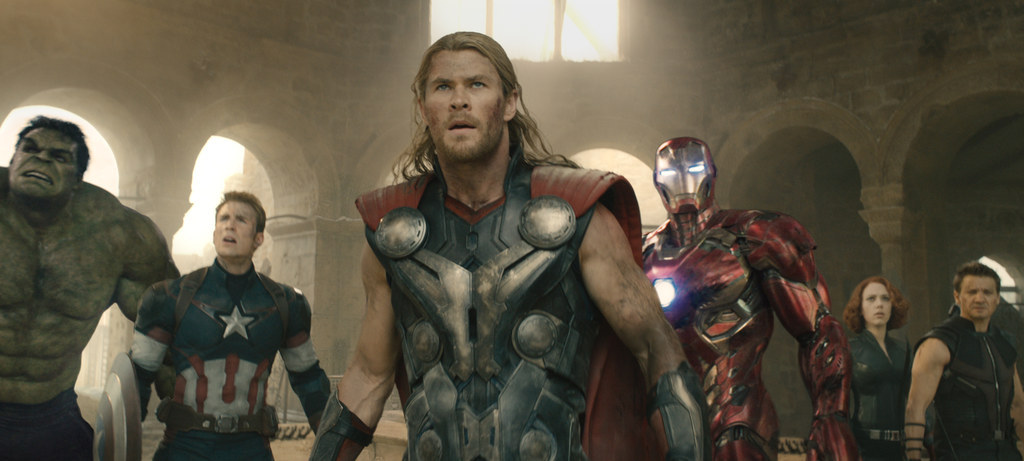
Directed by: Joss Whedon
Screenplay by: Joss Whedon
In sharp contrast with Ant-Man, the second assembly of Marvel Studios' central mega-franchise is so big that it ends up defining the creative boundaries of the Marvel Cinematic Universe by nearly bursting at the seams. It is overgrown with characters — there are 10 major ones, and another 12 (at least) significant supporting roles — and havoc and carnage abound from New York to South Africa, and South Korea to a fictional Eastern European country that is literally blasted into the sky. The psyches of our dashing superheroes are unraveled in dark, fractured fever dreams, and by the end, the Avengers have been splintered apart and reformed anew.
You can feel Whedon's tattered nerves as he strived to fulfill his own vision while also servicing Marvel Studios' need to use the film to feed its growing network of interconnected franchises. But the movie also manages to be about something — about several somethings, actually, including our penchant for creating our own villains, the sacrifices that come with extreme heroism, and the soft fascism inherent in a self-governing world police. It's an ungainly movie, one that entertains and fatigues and provokes and confounds, sometimes within the same scene. But no one can fault it for not trying to take a massive swing.
17. Captain Marvel (2019)
Directed by: Anna Boden and Ryan Fleck
Screenplay by: Anna Boden, Ryan Fleck, and Geneva Robertson-Dworet (with story by Nicole Perlman, Meg LeFauve, Anna Boden, Ryan Fleck, and Geneva Robertson-Dworet)
For most of Captain Marvel’s runtime, all that Carol Danvers (Brie Larson) knows about herself is that she’s been living on the alien Kree homeworld for six years, and a little sci-fi gizmo attached to the back of her neck has supposedly given her the ability to shoot powerful photons from her fists. Not knowing who she really is becomes Carol’s central conflict — she doesn’t even know her own given name — but that isn’t a compelling engine for character development on its own. Carol’s hyper-competent determination and pluck are evident from the start, and Larson, appealing as she is, never quite figures out how to translate the character’s self-discovery into a journey or transformation that’s visible onscreen.
After Carol crash lands on Earth circa 1995 in pursuit of alien Skrulls, she partners up with young S.H.I.E.L.D. agent Nick Fury (Samuel L. Jackson, uncannily de-aged by CGI). Their playful banter — and Larson and Jackson’s enjoyable chemistry — evoke mildly appealing buddy cop action comedies from the 1990s. Directors Anna Boden and Ryan Fleck, best known for character-driven indies like Half Nelson and Mississippi Grind, keep Captain Marvel pleasantly churning along in that gear, every so often dropping brief flashbacks to Carol’s hardscrabble backstory that are diverting, but never exactly surprising. So it’s a huge, overdue relief when Carol finally remembers her full history, and realizes that the sci-fi gizmo on her neck has actually been inhibiting the full potential of her powers.
Once that gizmo is gone, her abilities explode, and the first Marvel Studios movie built around a single female superhero finally comes to life — in no small part thanks to Carol’s scene-stealing cat, Goose. Still, Captain Marvel never quite shakes the feeling that it’s a feature-length flashback meant to set up Carol’s role in the impending Avengers: Endgame. The character’s mantra is “higher, further, faster,” and I ended up wishing the film had heeded it.
16. Captain America: The First Avenger (2011)
Directed by: Joe Johnston
Screenplay by: Christopher Markus and Stephen McFeely
This rousing, period war picture was the first to prove that Marvel Studios can turn out a good movie that doesn't revolve around a hero with larger-than-life abilities. Chris Evans' transformation from weakling to dear-lord-look-at-the-size-of-those-pecs adonis is something to behold, and Hugo Weaving's Red Skull is easily my favorite Marvel Studios villain next to Loki. My biggest complaint is that Evans' Steve Rogers, like the movie itself, is sorta square — a kind way of saying "bland" — and some of the visual effects lack the polish of the rest of the movies on this list. There are people who love this movie; for me, it's Marvel in a minor key, but still an enjoyable one.
15. Thor (2011)
Directed by: Kenneth Branagh
Screenplay by: Ashley Edward Miller, Zack Stentz, and Don Payne (with story by J. Michael Straczynski and Mark Protosevich)
After Iron Man 2 was such a disappointment, there was reason to wonder how Marvel could make a quasi-Nordic god whose weapon is a giant hammer into a viable feature-film hero. The answer, it turns out, is to hire a director with a deep understanding of Shakespeare who can make the movie into a rich brothers-competing-for-their-father's-love saga that evokes the Bard himself. Plus, this film introduces Loki, one of the best movie villains of the last 25 years. Period.
14. Spider-Man: Far From Home (2019)
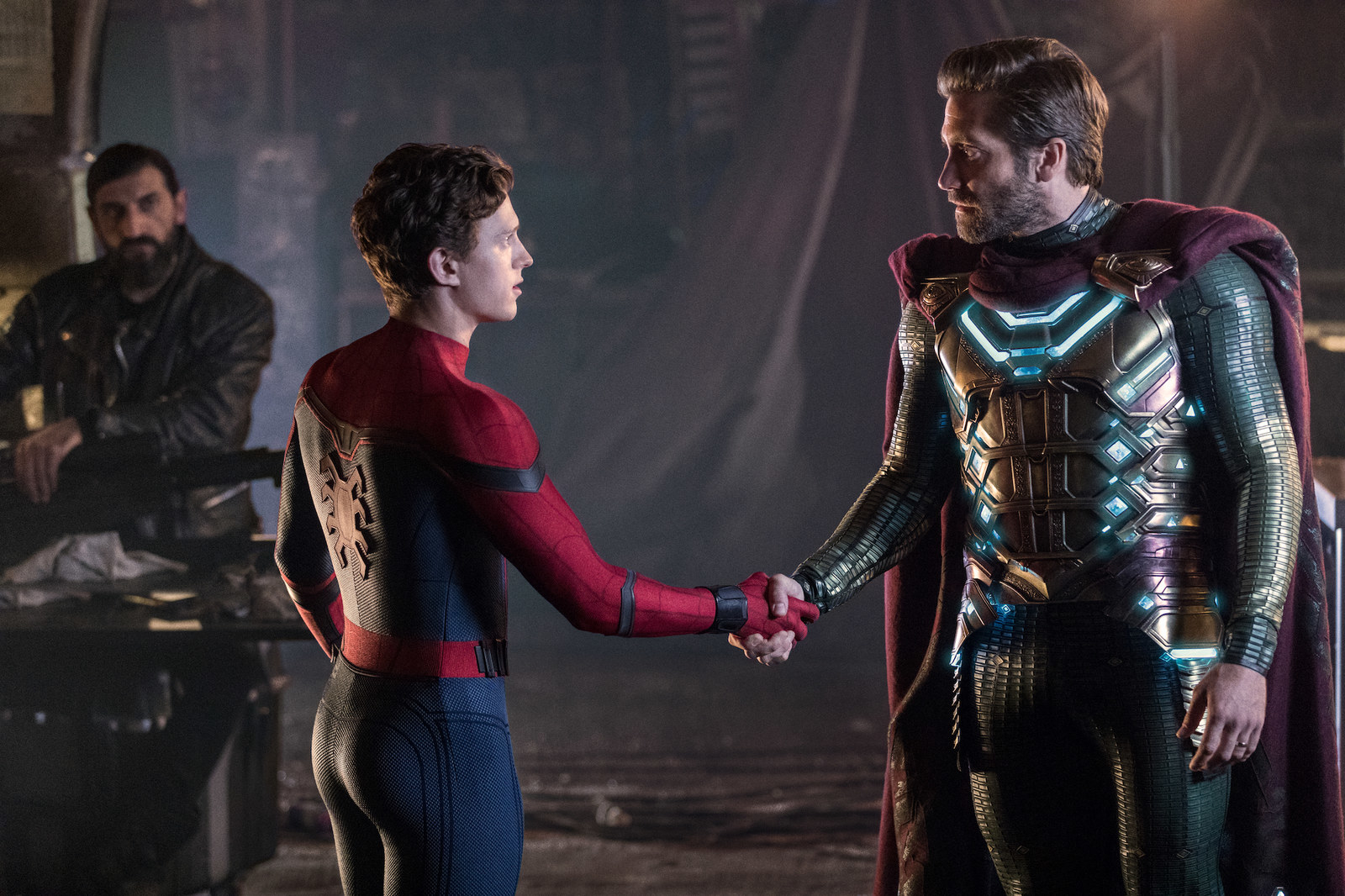
Directed by: Jon Watts
Screenplay by: Chris McKenna, Erik Sommers
Spider-Man’s second (semi-)solo feature opened just two months after Avengers: Endgame’s blockbuster conclusion to Marvel Studios’ 22-film Infinity Saga, which positions it as an effervescent, epilogue-y bridge between whatever the MCU was before, and whatever it’s going to be next.
For one, the ghost of Robert Downey Jr.’s dear departed Tony Stark deliberately haunts the film. No matter where Peter Parker (Tom Holland) goes on his high school’s trip across Europe, there are tributes to the slain Avenger everywhere, and Nick Fury even bequeaths Peter a pair of Tony’s all-powerful sunglasses. For another, Fury conscripts Peter into joining the powerful, aptly named Mysterio (a slick Jake Gyllenhaal) on another mission with the fate of the entire planet teetering in the balance. But all his Avenging has Peter desperate to just be a normal kid again, so he can finally declare his affection to his longstanding crush MJ (Zendaya, delightfully deadpan). It all plunges Peter into a who-do-I-want-to-be crisis. He even says aloud, “The whole world is asking, ‘Who’s going to be the next Iron Man?’”
It’s no spoiler to say the movie’s ultimate answer is: Obvs, it’s Spider-Man. Getting Peter to embrace his web-slinging destiny, however, takes him on a journey riddled with spoilers, as the film picks apart the idea of what it means to be a superhero in ways that are way more visually inventive — and more meta — than they initially seem. I enjoyed thinking about Far From Home’s clever, timely twists after it was over, but they added up to a weirdly rushed and hollow experience in the moment. In 2004, Spider-Man 2 rooted Peter’s existential crisis in emotional stakes that felt (for a superhero movie) honest and real. In Far From Home, it feels like it’s just part of the show.
13. Doctor Strange (2016)
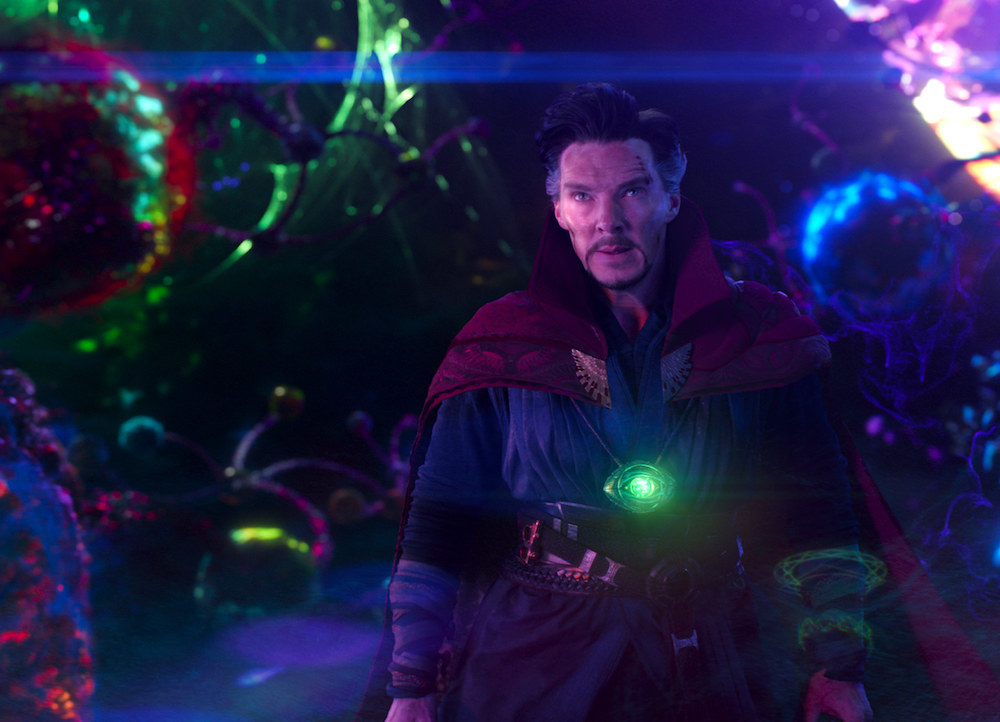
Directed by: Scott Derrickson
Screenplay by: Jon Spaihts, Scott Derrickson, and C. Robert Cargill
Visual invention has never been the biggest selling point for the Marvel Cinematic Universe. That's not to say Marvel Studios' films are ugly or dull to look at — just that the celebrated cohesion of the MCU has created a pervasive house style that has most of its films looking like all the others.
Doctor Strange shatters that pattern, hopefully for good. Derrickson's kaleidoscopic approach to Strange's battles within the film's otherworldly realms and mirror dimensions melds Escher and Dalí with the original psychedelia of Marvel comic artist Steve Ditko. The result is a bracing and visually literate mind-fuck. The playful script, matched with Benedict Cumberbatch's dyspeptic intelligence in the title role, also goes a long way in selling all this mystical silliness. And the film's third act resolves with a climax that, for once, is as much about Strange's cognitive acumen as it is about his ability to give (and take) a punch.
Tilda Swinton, meanwhile, brings her (un)usual uncanniness to the pivotal role of Strange's mentor, the Ancient One. But as my colleague Alison Willmore has noted, her singular presence cannot rectify how much the film relies on unthinking Orientalist pastiche. Derrickson's well-meaning choice to cast Swinton as a way to side-step the unfortunate Asian caricature of the original comic book character just ends up swapping 20th century racism for 21st century whitewashing. One hopes that Strange's inevitable, mind-bending future adventures also find a way to escape this unnecessary narrative trap.
12. Thor: Ragnarok (2017)
Directed by: Taika Waititi
Screenplay by: Eric Pearson, Craig Kyle, and Christopher Yost
Six years after the first Thor movie, the initial decision to treat the franchise as superhero Shakespeare — which made perfect sense at the time! — had ossified the character into a vaguely serious beefcake who was kind of just there. Enter Taika Waititi's Day-Glo shockwave of gonzo irreverence. Harnessing Chris Hemsworth's uncanny comic timing, the brilliantly outré production design, and Waititi’s own deadpan sensibility, the director has transformed everything solemn and somber about the previous two Thor films into the fizziest comedy in the MCU. There is much to love here, from Jeff Goldblum unleashing his ad-libbing id as the scheming Grandmaster, to Mark Ruffalo's Hulk walking around in the buff while trading buddy comedy quips with Thor, to the only good thing Matt Damon accomplished in 2017 as (I think?) an Asgardian community theater actor playing a heroic version of Loki. It's a relief to realize that Marvel Studios has become such a cultural juggernaut that its filmmakers are finally being given room to color outside the lines.
Waititi's irreverence, however, can only take this movie so far. Sure, it’s fun, but it almost reflexively pushes away the deeper feelings bubbling underneath its story, like a friend who’s always cracking jokes to avoid dealing with real emotions. I kept waiting for Tessa Thompson's Valkyrie to get a big emotional payoff for her character's tragic backstory. (Instead, clear evidence of Valkyrie's bisexuality was cut from the film.) Thor: Ragnarok also merely teases with the idea of Asgardians becoming galactic refugees, and the Thor/Loki relationship, which used to be the best part of the entire franchise, feels especially underbaked.
As for Cate Blanchett's villainous Hela, I'm shocked to say that I was slightly underwhelmed. I mean, she definitely has some killer moments, and she looks like she's having wicked fun. But a seemingly last-minute decision to change the character's accent from the hard-edged, working-class one she did during filming to a blandly posh one in post-production kept the editors cutting away from her face to hide the switch. You don't cut away from Cate Blanchett's face! You don't do it! Ever!
11. Avengers: Infinity War (2018)
Directed by: Anthony Russo and Joe Russo
Screenplay by: Christopher Markus and Stephen McFeely
Infinity War’s ultimate cliffhanger ending is the most exciting and vexing thing about it, at once stunning in its audacity (and meme-ability), and unsatisfying in its obvious lack of resolution.
In that way, however, Infinity War is the culmination of everything that’s been so great and so frustrating about the Marvel Cinematic Universe to date. At its best, the 19th movie within the MCU makes fabulously entertaining use of our investment in so many of the characters from the previous 18. Again and again, I found myself almost dizzy with anxiety over the existential peril facing Tony Stark and Peter Parker and Scarlet Witch and Gamora and Doctor Strange and Okoye and so many others as they crash into the brutal will of Thanos (Josh Brolin) and his Black Order of minions (only one of whom, the fanatic wizard Ebony Maw, makes much of an impression). Even better: the sublimely fizzy comedy that bubbles from all these disparate characters colliding with one another, like Star-Lord trying to face off with Thor or what happens when Bucky first meets Rocket.
But there are so many characters at play throughout this movie — roughly 40 of at least of some significance — and many get the short shrift here. First among them are Chris Evans’ Captain America, Scarlett Johansson’s Black Widow, and Chadwick Boseman’s Black Panther, all of whom are not much more than glorified stunt doubles for most of the film. At its worst, Infinity War is a reminder of how so many of the movies within the MCU feel somehow…less than a complete experience unto themselves. The dramatic stakes can’t quite matter as much as they should because we already know there are other ongoing franchises that need their characters to be alive and in fighting shape.
And yet, the literal life-or-death stakes at the end of Infinity War do carry the promise that when the credits roll on Endgame, the MCU will be left in profoundly different shape than when it started — a promise Endgame certainly fulfills. And thank goodness, because it would have been be pretty terrible if these characters — and their audience — went through all this for nothing.
10. Captain America: Civil War (2016)
Directed by: Anthony Russo and Joe Russo
Screenplay by: Christopher Markus and Stephen McFeely
Captain America may be in the title, but this is unmistakably a third Avengers movie. The film spends as much time ruminating over Tony Stark's guilt for creating Ultron as it does pushing Cap into making some surprisingly rash, selfish choices to protect his BFF Bucky (Sebastian Stan). And then there's the burgeoning relationship of Scarlet Witch (Elizabeth Olsen) and Vision (Paul Bettany), the introduction of T'Challa, aka Black Panther (Chadwick Boseman), and the machinations of Zemo (Daniel Brühl) to get all these superheroes fighting each other.
With this many storylines to service, it's no wonder this is the MCU's second-longest film to date (just behind Infinity War), and it's also no shock that this remains the MCU's most TV-like film as well. So much of what resonates here — between Tony and Cap, Cap and Bucky, Rhodes and Tony, and Black Widow and everyone — links back to some of the earliest movies in this ever-expanding world. If you're the kind of cinema purist who needs a feature film to feel like a movie and not the eighth season of the most expensive TV show ever made, then Civil War is bound to be a least a little confounding.
But it's also enormous fun, and not just due to the sight of Ant-Man becoming Giant-Man. Whatever corporate magic Marvel Studios chief Kevin Feige wielded to get Spider-Man (Tom Holland) into this universe was completely worth it — Holland is just gangbusters in the role. And unlike the other superheroes-fighting-superheroes movie from 2016, the final fight between Cap and Iron Man feels deeply personal, precisely because it draws upon so many years of history between them — and our emotional investment in them.
9. Spider-Man: Homecoming (2017)
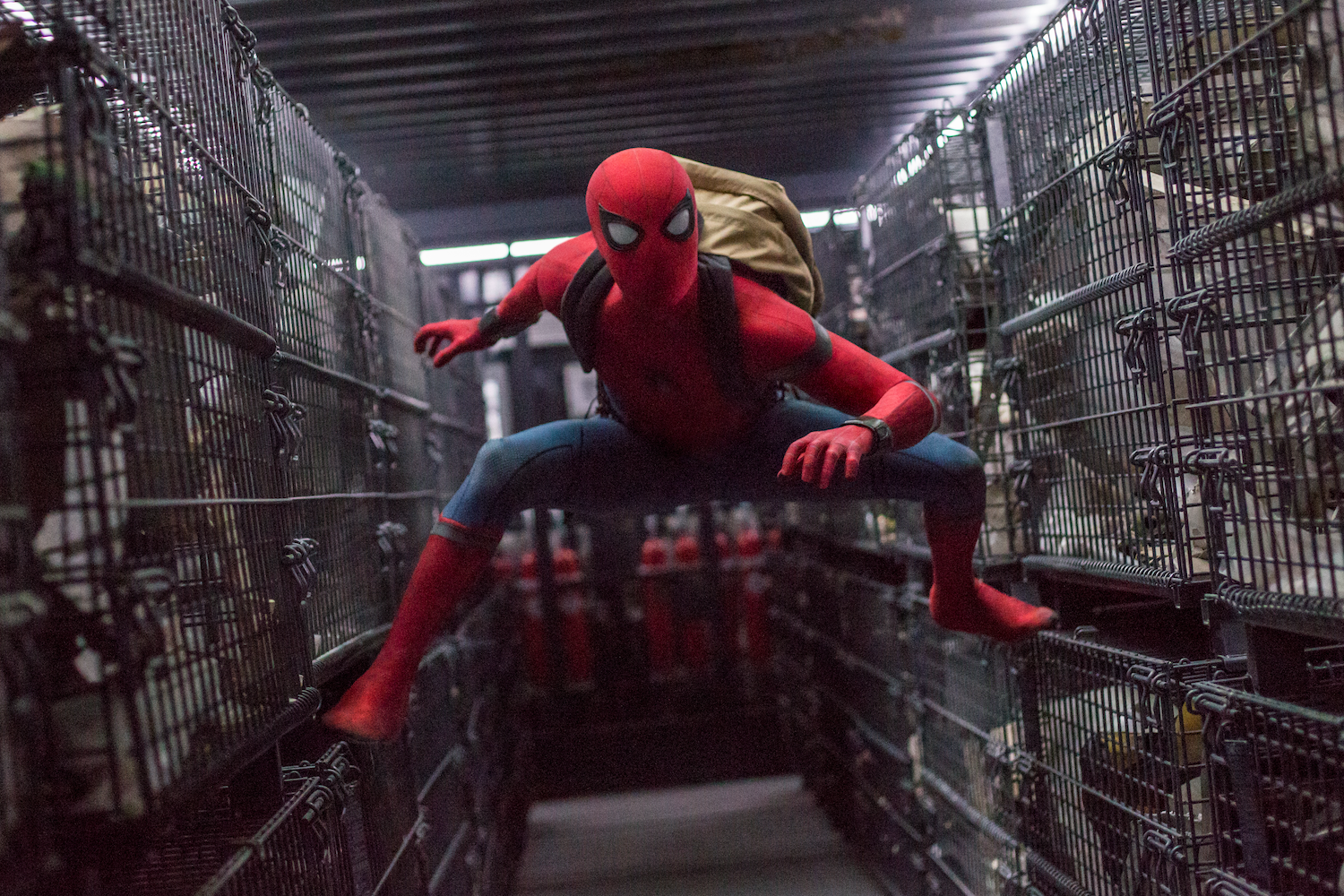
Directed by: Jon Watts
Screenplay by: Jonathan Goldstein, John Francis Daley, Jon Watts, Christopher Ford, Chris McKenna, and Erik Sommers (with story by Goldstein and Daley)
The most immediately striking thing about the third version of Spider-Man in 10 years is how deeply embedded it is within the MCU. In a miracle of cross-corporate dealmaking, Sony Pictures agreed to let the folks at the Disney-owned Marvel Studios bring its crown jewel superhero into their sprawling — could we say web-like? — cinematic universe, and good golly, did they ever. Robert Downey Jr.'s Tony Stark swoops in now and again as a genial, if not distant father figure to Peter Parker (Tom Holland), who's desperately trying to be a good enough superhero to join the Avengers full-time. At least three other MCU actors pop up too in delightful cameos, and Homecoming directly references events in Civil War, The Avengers, and Age of Ultron, with throwaway nods to several others (woe betide the casual Spidey fans who show up to this movie unfamiliar with the 15 movies that have come before it).
There is so much that this Spidey movie gets right, but what it does best is making Peter a teenage nerd and surrounding him with other teenage nerds. Holland actually looks and acts like a high school sophomore instead of an emo twentysomething with a conveniently high register, and his diverse crew of academic decathlon buddies embrace their braininess with such gusto that my heart began to soar.
Ironically, that infectious youthful spirit drains from the movie the moment Peter shows up to the titular homecoming dance and the frenetic final act kicks into gear. Homecoming benefits enormously from Michael Keaton's central villain Adrian Toomes (aka Vulture) who feel like a real person instead of an arch caricature, and his unexpected connection to Peter's life makes for a great twist. But their final battle is under-lit and over-edited, lacking the ingenuity and dazzle of the movie's crackerjack mid-story action sequence at the Washington Monument. And for all of Holland's winning charm, the movie seems almost afraid to let his Peter feel anything other than really, really eager to finally be a hero. Still, I left Homecoming high on the potential hiding inside Peter's adolescent heart, and I can't wait to see where he swings to next.
8. Guardians of the Galaxy (2014)
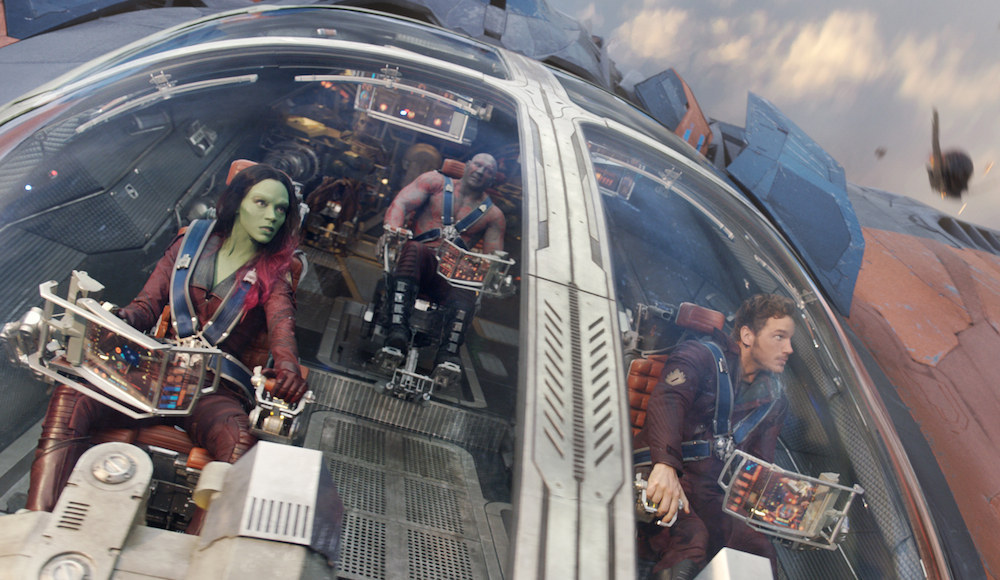
Directed by: James Gunn
Screenplay by: James Gunn and Nicole Perlman
For some, Guardians of the Galaxy is Marvel Studios' best movie. I totally understand why. This movie is a blast, with smart-ass dialogue that crackles, a gorgeous sci-fi visual flair, and a fleet, irreverent sense of humor that is unafraid to be blissfully weird. Chris Pratt becomes an automatic leading man as Peter Quill; Vin Diesel has arguably never given a more appealing performance as the giant tree person Groot; and Rocket Raccoon — with Bradley Cooper's voice and an on-set acting assist from Sean Gunn — was one of the breakout characters of 2014.
The plot, however, barely registers — it's stop-the-bad-guy-from-getting-the-MacGuffin boilerplate with pretty much zero connection to the main characters, other than Dave Bautista's Drax the Destroyer. Ultimately, the movie feels like it's setting up an outrageously great sequel — which, in fact, it did! That bad guy, Lee Pace's Ronan the Accuser, looks cool, but he's a snooze-fest of "I'M A VILLAIN" posturing otherwise. And it feels like there was a lot more of Benicio del Toro's brilliantly bizarro Taneleer Tivan that was, oddly, left on the cutting room floor.
Other than that, though? A delight.
7. Iron Man (2008)
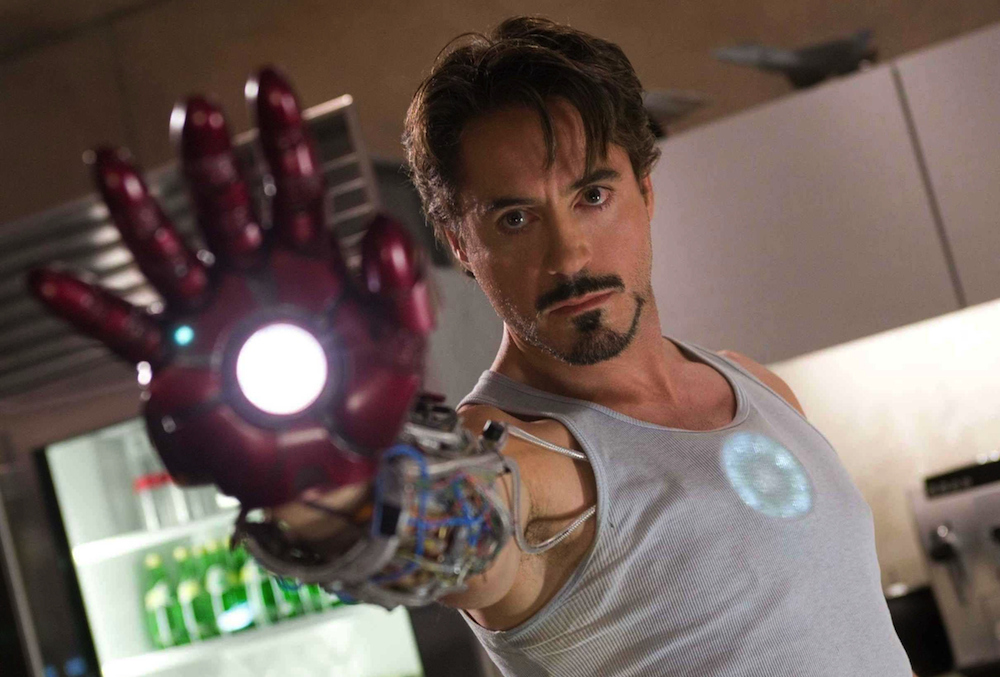
Directed by: Jon Favreau
Screenplay by: Mark Fergus, Hawk Ostby, Art Marcum, and Matt Holloway
Marvel Studio's very first film as an independent filmmaking company gets just about everything right, from casting Downey Jr. (a risky venture in the pre-Obama days) as Tony Stark, to establishing a bright, unironic, playful style that has remained consistent through just about every other Marvel film since. Watching it now, with its story of Homeland-style Islamic terrorists and out-of-control military spending, the film feels almost adorably small in comparison to the ones that followed. But it still looms immeasurably large within the Marvel universe.
6. The Avengers (2012)
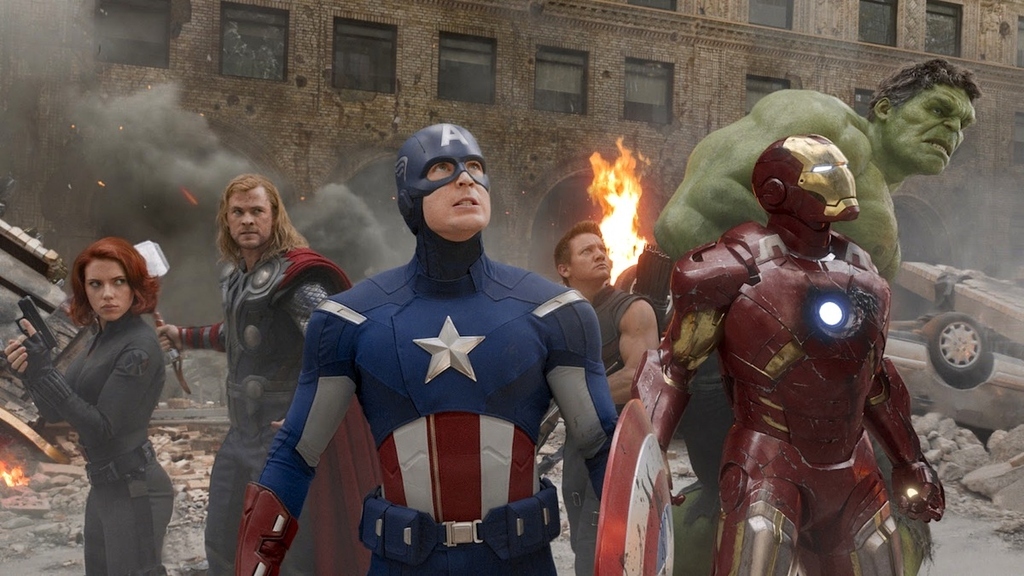
Directed by: Joss Whedon
Screenplay by: Joss Whedon (with story by Zak Penn and Whedon)
For so many reasons, this movie should not have worked. But by some miracle, Whedon found a way to bring all these desperate characters together that not only made (comic book) sense, but was fabulously exciting to watch, especially in a theater packed with other moviegoers. Sure, the invading alien force was a bit nonspecific, and yeah, it is a little numbing to see New York City reduced to rubble in yet another effects-driven summer movie, but this is popcorn-blockbuster filmmaking of the highest order. And, finally, they get the Hulk totally right.
5. Iron Man 3 (2013)
Directed by: Shane Black
Screenplay by: Drew Pearce and Shane Black
Think this is ranked too high? Well, hear me out. For one, co-writer-director Shane Black figures out a way to probe Tony Stark's troubled psyche without making him into an obnoxious bore, and the film is all the more psychologically compelling because of it. For another, by keeping the plot's stakes from becoming apocalyptically huge, Black instead finds the breathing room to introduce some surprisingly topical sociopolitical satire with a twist that is just too delicious to spoil years after the film's opening weekend. Both Ben Kingsley and Guy Pearce seem to have the time of their lives as the film's two heavies, and, at long last, Gwyneth Paltrow's Pepper Potts is allowed to do more than alternate between dewy love and measured exasperation. The action pops, the jokes are laugh-out-loud funny, and there is even an adorable kid sidekick who you don't want to throttle for cutesifying the movie. What more could you want?
4. Guardians of the Galaxy Vol. 2 (2017)
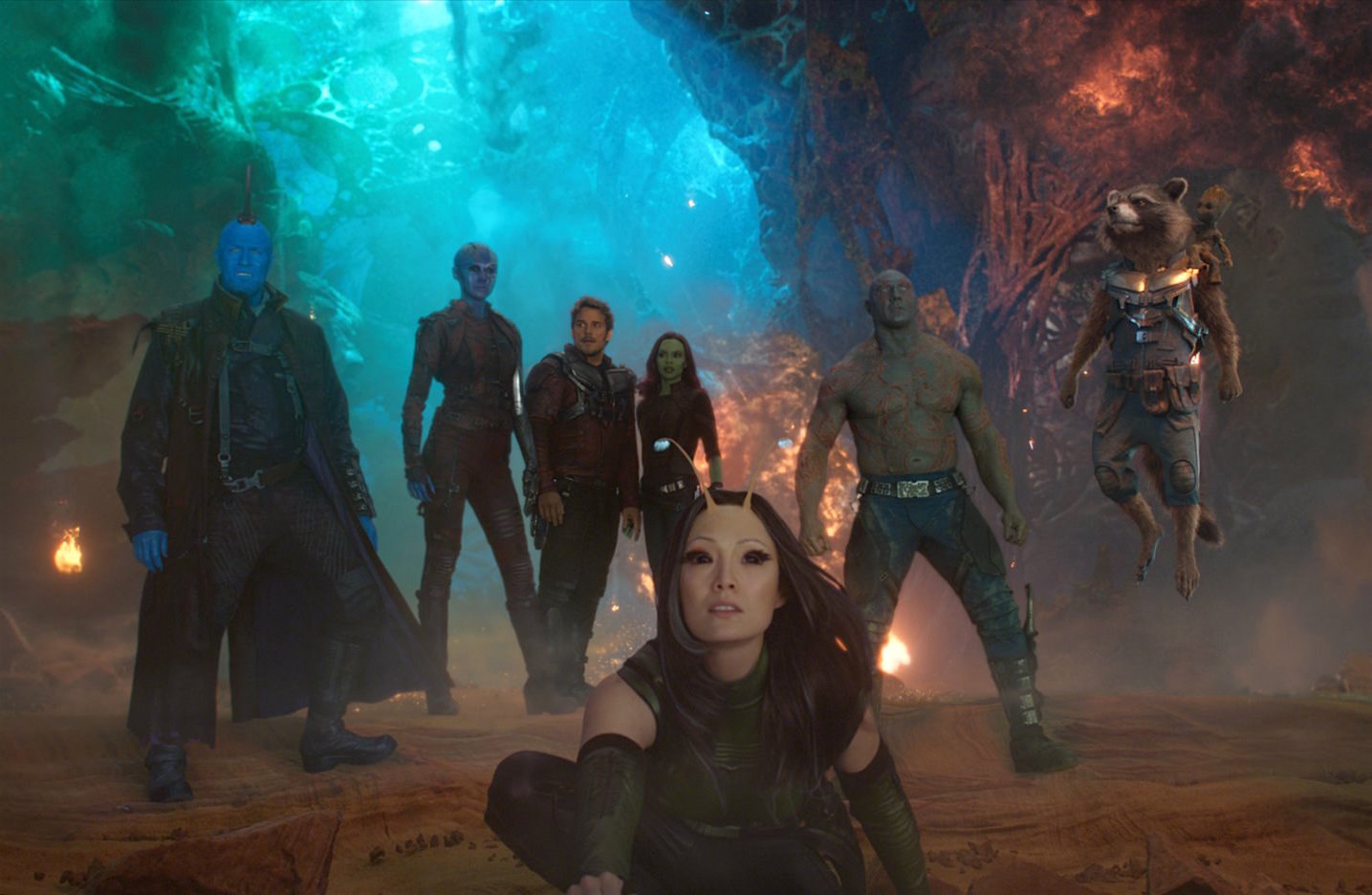
Directed by: James Gunn
Screenplay by: James Gunn
The first Guardians was a desperately welcome blast of fresh, irreverent air — for Marvel Studios, and the entire superhero genre. By definition, its sequel cannot possibly recreate that feeling, and it doesn't really try to. Instead, Gunn deepens our understanding of the private pain that haunts each of his characters — including two of the previous film's ostensible antagonists, Nebula (Karen Gillan) and Yondu (Michael Rooker) — resulting in the most powerfully emotional climax to that point in the MCU by a light year.
The path to that final act gets kind of shaggy, which could strike some as a refreshing change from the relentless narrative churn of superhero movies, and others as maaaybe a little irksome. Gunn does expend a lot of screen time explaining who — or, more precisely, what — are Peter Quill's father Ego (Kurt Russell, perfectly cast), and his empathic assistant Mantis (Pom Klementieff, ditto).
That meandering, however, is what allows Gunn to let these characters play off of each other to such funny and meaningful effect — and keep the story he's telling focused entirely on them, rather than an external problem they have to solve. He employs even richer, more cinematic visual palate than in his first film, as well as plenty of the freakish, off-beat humor that endeared this franchise to audiences in the first place. (And, of course, there's the devious cuteness of baby Groot.)
Guardians Vol. 2 feels personal in a way Marvel Studios' films have rarely been, and with the Guardians finally joining the larger MCU in 2018's Avengers: Infinity War, one hopes that feeling will inspire the rest of this cinematic universe to be more like it.
3. Avengers: Endgame (2019)
Directed by: Anthony Russo and Joe Russo
Screenplay by: Christopher Markus and Stephen McFeely
If The Avengers felt like a miracle when it opened in 2012 — and it really did — what word could possibly capture the feeling of watching Endgame, a movie so massive, so long, so entangled with narrative strands to unravel and resolve, that still manages to shock and delight and just work this damned well?
Good grief, am I really forced to call this film a marvel?
It’s not nearly perfect, to be clear. The monumental task of undoing the devastation of Thanos’s snap forces the remaining Avengers (and Endgame’s filmmaking team) to lean hard on the tried and true storytelling trope of time travel. That provides the audience with scene after fan-service-y scene of the characters revisiting past glory and encountering departed compatriots and future enemies. It’s incredible fun, but it also means the film’s underlying story is as impossibly confusing as Infinity War’s was straightforwardly simple. You just have to go with it, but I wish so much of the film’s plot didn’t feel so flimsy when held up to scrutiny.
In the moment of viewing, however, that barely matters. Endgame’s biggest fan service is in how deeply it rewards our emotional attachment to these characters — I cried multiple times, sometimes in grief, and at least once, during the film’s gargantuan climax, with overwhelming joy. There’s one death that frustrates the hell out of me, and Thor seems to be living in a different, much sillier movie than everyone else. But there will never be another movie like Endgame, and as the final credits rolled, I was left feeling at once exhausted — so much movie! — and grateful.
2. Black Panther (2018)
Directed by: Ryan Coogler
Screenplay by: Ryan Coogler and Joe Robert Cole
For all their highly lucrative dazzle, a common knock on Marvel Studios movies is that they don't have much to say about the world as it is today. That's not entirely fair — I still contend the Mandarin twist in Iron Man 3 is one doozy of joke about post-9/11 fearmongering. Even so, the MCU has redefined modern cinematic escapism with super-suits, infinity stones, helicarriers, and talking raccoons, often at the expense of Big Ideas.
Which makes Black Panther a watershed moment for Marvel. It was always going to be cultural milestone, as the first film in modern Hollywood history to have both a nine-figure budget and a predominantly black cast. But cowriter-director Ryan Coogler (Creed, Fruitvale Station) has done something almost alchemic: He's harnessed the tropes of comic book moviemaking to cut deep into pressing issues about our current moment that have rarely if ever made it into a blockbuster. This is a movie that has a lot on its mind — about the African diaspora, Afrofuturism, the morality of isolationism versus interventionism — and yet Coogler never lets that weightiness hobble the movie. Instead, the film sings, lifting the audience's consciousness with it.
It helps immensely that the cast is an embarrassment of black excellence — Angela Bassett! Forest Whitaker! Lupita Nyong'o! Daniel Kaluuya! Sterling K. Brown! — but if I had to single out anyone, Danai Gurira (as Dora Milaje commander Okoye) and Letitia Wright (as T'Challa's sister and technological prodigy Shuri) walk away with every scene they're in.
That is, so long as Michael B. Jordan isn't in it, too. As the lead villain Erik Killmonger, Jordan practically vibrates with a hard-earned rage, and embodies Coogler's desire to use Black Panther to confront what it would actually mean in the world today for black people to learn about a country like Wakanda, a technological and economic powerhouse hidden in the heart of Africa. In fact, Chadwick Boseman's T'Challa recedes in comparison to Jordan (and even Andy Serkis's campy Ulysses Klaue) — a common problem for Marvel's male heroes who aren't played by Robert Downey Jr., but acutely on display here.
In its third act, Black Panther also unwittingly exposes the limitations of the Marvel Studios machine. After a fabulously stylish sequence in South Korea, the film's climactic battle in Wakanda feels generic and greenscreen-y, preoccupied with busy visual details in a way that undernourishes what should be a major emotional catharsis. It's an all-too familiar issue with the MCU (and most superhero movies, in general), and it's deflating to recognize that the very thing that allowed this miracle of a movie to exist at all is also what's holding it back from being the best version of itself. That’s by inches, however, and the film is already so far ahead of (almost all of) its MCU brethren. So much of what makes Black Panther as great as it is also charts an invigorating new direction for Marvel — one can only hope the company will take it.
1. Captain America: The Winter Soldier (2014)
Directed by: Anthony Russo and Joe Russo
Screenplay by: Christopher Markus and Stephen McFeely
Unlike so many of Marvel's movies, The Winter Soldier features spectacular, wholly distinctive action scenes from start to finish. At least one — Cap defeating a squadron of Hydra goons in a glass elevator, with one arm tied behind his back — should be studied in film schools for how to be awesome. And, like many of Marvel's movies, it has a thrilling, high-flying climax in which millions of lives are at stake, and giant things in the air crash into tall buildings on the ground and go boom. (There is a separate discussion to be had about how the MCU’s fixation on disaster imagery, apocalyptic evil, and the appealing fantasy of powerful, selfless protectors has been Hollywood's most sustained reaction to September 11 outside of the Dark Knight trilogy, but let's not digress too much here.)
What sets Cap 2 apart — and makes it, in my opinion, the best in the MCU — is that that climax underlines the wreckage of the fractured brotherhood between Cap and Bucky. As astonishing as it is visually, this sequence works even better as a powerful emotional crescendo. The blows these two men land sting well beyond their super-strength, and when Cap says to Bucky, “I'm with you to the end of the line,” it's an emotional wallop that drives home exactly what makes Cap such a singular hero, and what makes his connection to Bucky the most resonant — and Tumblr-igniting — of any pairing within the MCU.
Marvel's plots often tend to be well-crafted excuses to see superheroes be super heroic, but from the start, Cap 2 uses its story to crack open Cap and expose the man inside the stars-and-stripes costume. As an airtight, electrifyingly entertaining thriller, the film also takes a Thor-like hammer to S.H.I.E.L.D., the infrastructure that had held the Marvel Cinematic Universe together and given Cap purpose until he realized he had to blow it up. (Coming just a year after the Edward Snowden revelations, it's also a remarkably trenchant exploration of how global surveillance by a faceless government entity is pretty damn evil.) Also! Nick Fury (Samuel L. Jackson) gets into a nail-biting standoff alone in his super-car, and eventually takes off his eye patch. And! Sam Wilson (Anthony Mackie) swoops in as a regular human soldier who can fly like a falcon, further grounding the film in the here and now. And also! Several women — especially but not exclusively Black Widow (Scarlett Johansson) — kick major ass. This is Marvel in a major key, and the music is so, so sweet.
UPDATE
This post has been updated to include an entry for Spider-Man: Far From Home. Earlier updates included entries for Avengers: Endgame, Captain Marvel, Ant-Man and the Wasp, Avengers: Infinity War, Black Panther, Thor: Ragnarok, Spider-Man: Homecoming, Guardians of the Galaxy Vol. 2, Doctor Strange, Captain America: Civil War, Ant-Man, Avengers: Age of Ultron, Guardians of the Galaxy, and Captain America: The Winter Soldier.
Marvel Studios has released a lot of movies, you guys.
